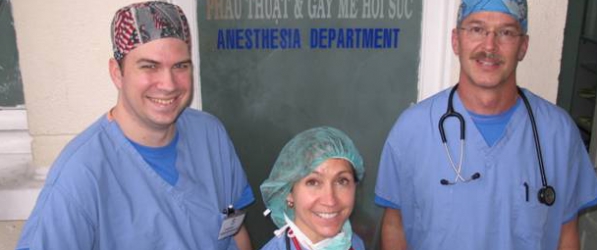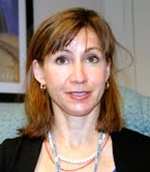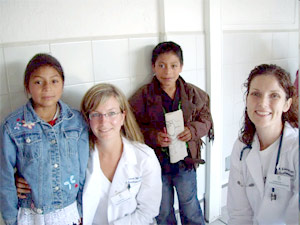
Dr. Boretsky received an advertisement from the Society for Pediatric Anesthesia. The ad featured a photo of a child with a cleft palate and a plea for volunteers to travel with Operation Smile to provide anesthetic care to children requiring corrective surgery. She read the note and thought, “I’d love to help but I have four kids to take care of,” and threw the ad away. Her 12-year-old daughter picked it out of the trash and asked, “What’s this?” Dr. Boretsky explained that Operation Smile recruits doctors to travel to poor countries to help children in need. She continued, “But I can’t go because I have to take care of you and your sisters.” Her daughter stared back at her and said, “Mom, how could you be so selfish? You can help this girl! What if this were me, wouldn’t you want someone to help me?” And, according to Dr. Boretsky, the next thing she knew she was on a plane to China.
While en route to China, Dr. Boretsky faced many doubts about her mission; here was a confident, highly trained, board-certified anesthesiologist, and yet she was terrified at what lay ahead of her. That first mission with Operation Smile was a success, and since then Dr. Boretsky has served on dozens of medical missions to some of the poorest countries in the world. She has traveled to Vietnam and Bhutan several times and took her second daughter, who is fluent in Spanish, to Guatemala with her to act as a translator. Next year, she will travel to Ghana and also plans to take her four daughters to Colombia.
Typically, Dr. Bor etsky’s mission groups treat three main types of patients. The first group are children with congenital birth defects; these patients suffer from various deformities such as cleft palates, fused hands, and club feet. Secondly, the mission groups frequently treat pediatric burn patients. In poorer countries, Dr. Boretsky explains, because of a lack of central heating many people are forced to use alternative means to keep warm. Often times children fall into fires, causing severe and disfiguring burns. The third main group of patients are children who have been mauled by wild animals, such as bears or wild cats. One particular child Dr. Boretsky treated was playing in his front yard when a wild cat attacked him and bit off his nose. These operations are far more than cosmetic — often times the injured children are completely ostracized by their families and communities, making surgery the only option for them to live a normal life.
etsky’s mission groups treat three main types of patients. The first group are children with congenital birth defects; these patients suffer from various deformities such as cleft palates, fused hands, and club feet. Secondly, the mission groups frequently treat pediatric burn patients. In poorer countries, Dr. Boretsky explains, because of a lack of central heating many people are forced to use alternative means to keep warm. Often times children fall into fires, causing severe and disfiguring burns. The third main group of patients are children who have been mauled by wild animals, such as bears or wild cats. One particular child Dr. Boretsky treated was playing in his front yard when a wild cat attacked him and bit off his nose. These operations are far more than cosmetic — often times the injured children are completely ostracized by their families and communities, making surgery the only option for them to live a normal life.

Several years ago, some physicians at UPMC Shadyside wanted to send residents on missions. Dr. Boretsky was concerned that the residents would be vastly underprepared; she explained that often times doctors travel to underprivileged countries and are shocked to find rudimentary equipment, unfamiliar procedures, and cultural barriers. But, she sensed an opportunity to raise awareness and to increase participation in the missions, so she created a resident training program that actually teaches the young doctors how to go on missions. The residents learn such things as how to pack properly, when to get vaccinated, how to abide by cultural customs, and what to do if there is no electricity in the operating room. This training prepares the residents for a totally new experience in the OR. For example, Dr. Boretsky says, “Here at Shadyside, we pretty much have an infinite supply of oxygen. However, in an OR in Vietnam, we may have one H cylinder tank to last us for a whole week.” Despite these challenges, Dr. Boretsky’s group adheres to ASA guidelines for basic anesthetic care. “We follow all of the guidelines, we just have to do it without the bells and whistles.”
This program has become so popular with the residents that two had to be turned away this year due to lack of funding. Some residents volunteered to do a Grand Rounds presentation to raise awareness for the training program. Dr. Boretsky hopes that this publicity will help earn support for the program, so that more residents will be able to experience this unique opportunity and will perhaps open their minds to a lifetime of service. She considers international humanitarian medicine to be a distinct medical specialty, because the experience forces doctors to use their knowledge and skills to get back to the basics of care giving.
